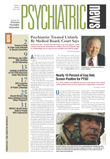In the State of the Union address in 2004, President Bush spoke to the value of electronic health records: “By computerizing health records, we can avoid dangerous medical mistakes, reduce costs, and improve care.” By last April he had created the new Office of the National Coordinator for Health Information Technology (ONCHIT). Since then, ONCHIT's coordinator, Dr. David Brailer, has taken the lead in a 10-year project to create a national health information network (NHIN). Such a network will enable patients and their care providers to access their entire medical history in real time from anywhere in the country (Psychiatric News, September 16, 2005).
This is a grand and revolutionary vision. It aims to eliminate many medical errors due to ignorance of established clinical facts. It promises to save money and boost productivity by eliminating much of the need for expensive repetition of tests, assessments, history taking, and documentation. In a digital world, where medicine has been justly criticized as the most IT-backward sector of the economy, such an initiative is inherently appealing.
The activities of medicine are broadly described as either cognitive or procedural. While both rely on history to some extent, there is no doubt that the cognitive specialties are especially dependent on an interlocked web of clinical information, both cross-sectionally from labs and other specialities involved in the current treatment, as well as longitudinally from previous treatment encounters. Much of the value in what cognitive specialties provide for patient care comes directly from the interpretation of such manifold data, in the context of the patient's presenting situation and the status of current evidence-based treatment guidelines. Without accurate and timely access to such data, the clinician is either forced to recreate it, if possible, or, even worse, guess.
In psychiatry (the preeminent cognitive specialty), history is needed to support both accurate diagnosis and treatment decision making. Diagnosis in psychiatry relies heavily on history, unlike some other medical specialties, where it can now sometimes be replaced by specific tests, such as genetic testing of patients or imaging. Likewise, evidence-based psychiatry relies heavily on knowledge of the patient's historical response to treatment. The very existence of a treatment algorithm, for example, assumes knowledge of the outcomes at the previous steps in the algorithm. If the patient cannot tell you what drug was previously tried and the outcome, how can the psychiatrist implement the best treatment algorithm?
Sadly, there are huge and costly domains of psychiatric care in which access to such historical information is sorely lacking. The usual obstacles to efficient communication of data are amplified whenever we deal with patients whose illness directly impairs their ability to provide reliable history. Whereas most medical and surgical patients can cooperate helpfully with history taking, many of our patients cannot: they are psychotic, manic, delirious, demented, mentally retarded, or very young and without a knowledgeable historian at the point of care. The need for reliable clinical information from an external source in patients with “a broken brain” is clear and compelling.
But to acquire such information in a timely way from our fractured care system is a challenge. Between the lack of resources to obtain the records, the delay in receiving them, the illegibility or sheer contentlessness of what is finally received, and the frequently lean staffing patterns of public-sector psychiatric clinics, it is not uncommon for no one to know the nature of a patient's first episodes 20 years previously. One can argue that the entire enterprise of deinstitutionalization has floundered, in part, because of the systemwide failure to address the medical informatics conundrum created when patients were released from state hospitals. For all their ills, they were in hospitals with a medical record. A NHIN could breathe new life into the vision of a “hospital without walls” to care competently for chronically mentally ill people in the community.
Of course, many psychiatrists do not practice in the public sector and treat populations that are both less impaired and more vigilant about their privacy. The concerns of an executive about who might learn of his drinking or depression are of a different nature. Contrasted to the “closed system” of our paper-bound office, the NHIN is an “open system,” and there is an unprecedented capacity for damaging information to travel quickly to unacceptable destinations. Even for something much less ambitious than the NHIN, such as the popular “personal health record,” it quickly becomes evident that patients' control over the content of such a record will be of singular importance to most people. This is not unique to psychiatry. There are already many other kinds of medical information carrying a high demand for privacy, such as HIV status and the results of genetic and other diagnostic testing for debilitating or fatal illnesses. Psychiatry can help heighten the awareness of the rest of medicine about the need to instill patient-controlled privacy protections into the very fabric of this brave new world of NHIN.
APA is already engaged with ONCHIT. A newly formed APA Corresponding Committee on Electronic Health Records is publicly advocating the value of a NHIN to enhance the care of people with chronic mental illness, while at the same time voicing in the strongest possible terms the need for patient-controlled privacy assurances at every nonemergent level of data transfer. In this way, APA can join with the rest of medicine as we enter the digital age while retaining psychiatry's historical core values for privacy and patient rights.
John Boronow, M.D., chair of the APA Corresponding Committee on Electronic Health Records, contributed to this column. ▪

